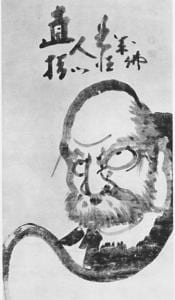The Case
The master Huoan asked, “Why is it the Western Barbarian has no beard?”
Gateless Gate, Case 4
I’m enormously fond of this case. It’s deceptively simple. In fact people in our lineage come upon it at a moment when most can “easily” pass it in the technical sense of Zen’s koan tradition. But, to get it deeply? Well, that can very much be another matter. A matter for a lifetime.
It’s similar to the Mu koan, where the student asks the master Wumen if a dog has Buddha nature. A question overbriming with all the weight of knowing the doctrinally correct response, but, aching with the body’s mass of doubt and perhaps even self-loathing. Certainly longing for understanding, and perhaps even setting the heart at ease. Here the questioner is asking something beyond doctrinally correct. And then when the master replies, “no,” worlds tumble, or might. If one is just a little lucky. And, willing to bow into the moment.
Perhaps the form of the question here with a beard is less painful, maybe even less urgent. Maybe its even a bit more playful. The Western barbarian is of course Bodhidharma, the sometimes historic, more often mythical bringer of Zen to China from India. He is portrayed with bulging eyes, surrounded by bristling eyebrows, and, always, always, a beard.
So, the matter turns on the beard that is no beard.
We don’t know a whole lot about the author of this koan, Huoan Shiti. He was born in 1108 and died in 1179. He is a dharma successor of the master Huguo Jingyuan. He lived in a time when paper money, gunpowder, and a compass that points true North were all developed. That kind of covers it.
Wumen’s sermon on the koan is nearly as brief as the koan.
“Practice must be authentic practice. Awakening must be authentic awakening. If you see the Barbarian’s face intimately, for yourself, you will win the great race. But, try to explain it, and your words will fall into true and false.”
In his verse on the case, Wumen warns us.
Do not discuss the dream
In front of a fool –
Barbarian without a beard!
It just obscures what is clear
The great American master of the intimate way Robert Aitken provides a commentary on this case quoting the poet Wallace Stevens.
His question is complete because it contains
His utmost statement. It is his own array.
His own pageant and procession and display.
Another contemporary commentator the Zen teacher Guo Go reminds us, “Practice is for fools, but it is very important.” Both Wumen’s verse and Guo Go’s comment remind me of that term first coined by the apostle Paul, in his letter to the Corinthians speaking of “fools for Christ.” And after him the Desert fathers & mothers who were called holy fools. And, of course, Francis of Assisi, sometimes called God’s fool, and at other times the only Christian.
Corollaries of foolish wisdom pop up in the world’s faiths. The madzub, God-crazed saints in Sufism. And, of course, Hanshan and later Ikkyu as obvious examples within our Zen tradition.
The intimate way is a calling into a certain foolishness. The smart, the clever, see no gain in the intimate way. And, there’s truth to that. After all, beards that are not beards?
But in Zen and other variations on the intimate way we are invited into something astonishing. That beard, for one thing. That beard that is not, for another. And here in this little case, it’s all on display. The pointing. The disruption of our ideas of what are and are not. The invitation.
Touch your face.
Is there a beard there or not?
If yes, what does that mean?
If no, what does that mean?
Dreams pile upon dreams, and we find ourselves presented with the simple truth. It contains words. It contains all the worlds. All we have to do is let go. Open our hands.
The pageant and the procession and the display.
Not one. Not two.













